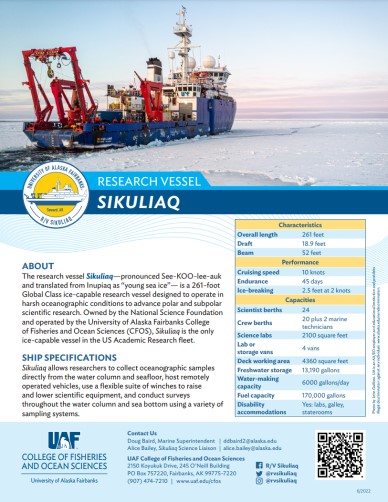About R/V Sikuliaq

R/V Sikuliaq, pronounced [see-KOO-lee-auk], is a 261-foot oceanographic research ship capable of bringing scientists to the ice-choked waters of Alaska and the polar regions. Sikuliaq, one of the most advanced university research vessels in the world, is able to break ice up to 2.5 feet thick. Constructed at Marinette Marine Corporation, a shipyard in Marinette, Wisconsin, Sikuliaq is homeported in Seward, Alaska, at UAF's Seward Marine Center.
The vessel is owned by the National Science Foundation and operated by the College of Fisheries and Ocean Sciences at the University of Alaska Fairbanks, as part of the U.S. academic research fleet. It is used by scientists in the U.S. and international oceanographic community through the University-National Oceanographic Laboratory System. UAF's Sikuliaq Ship Committee provides scientific oversight of Sikuliaq.
The need for a more capable ship to operate in the coastal and open ocean waters of the Alaska region was first recognized by marine scientists in the United States in 1973. In 2001, Congress appropriated $1 million for a design study. After 36 years of development and the consideration of multiple vessel designs, construction began on the ship in December 2009. The vessel was designed by The Glosten Associates, a marine architecture and engineering firm in Seattle. Sufficient ice strengthening allows Sikuliaq to work safely in moderate seasonal ice, operating over a longer period than formerly possible in the North Pacific Ocean, Gulf of Alaska, and the Bering, Chukchi, and Beaufort Seas. The design is based on science mission requirements developed by the University–National Oceanographic Laboratory System community.
Sikuliaq has accommodations for up to 24 scientists and students per cruise, including those with disabilities, to conduct multidisciplinary studies and to facilitate broadband real-time virtual participation of classroom students in expeditions, including remotely operated underwater vehicles. Sikuliaq supports the collection of sediment samples from the seafloor, remotely operated vehicles, the use of a flexible suite of winches to raise and lower scientific equipment, and surveys throughout the water column and sea bottom using an extensive set of research instrumentation. The vessel is designed to have the lowest possible environmental impact, including a low underwater radiated noise signature for marine mammal and fisheries work.
View/download R/V Sikuliaq Flyer [PDF]



